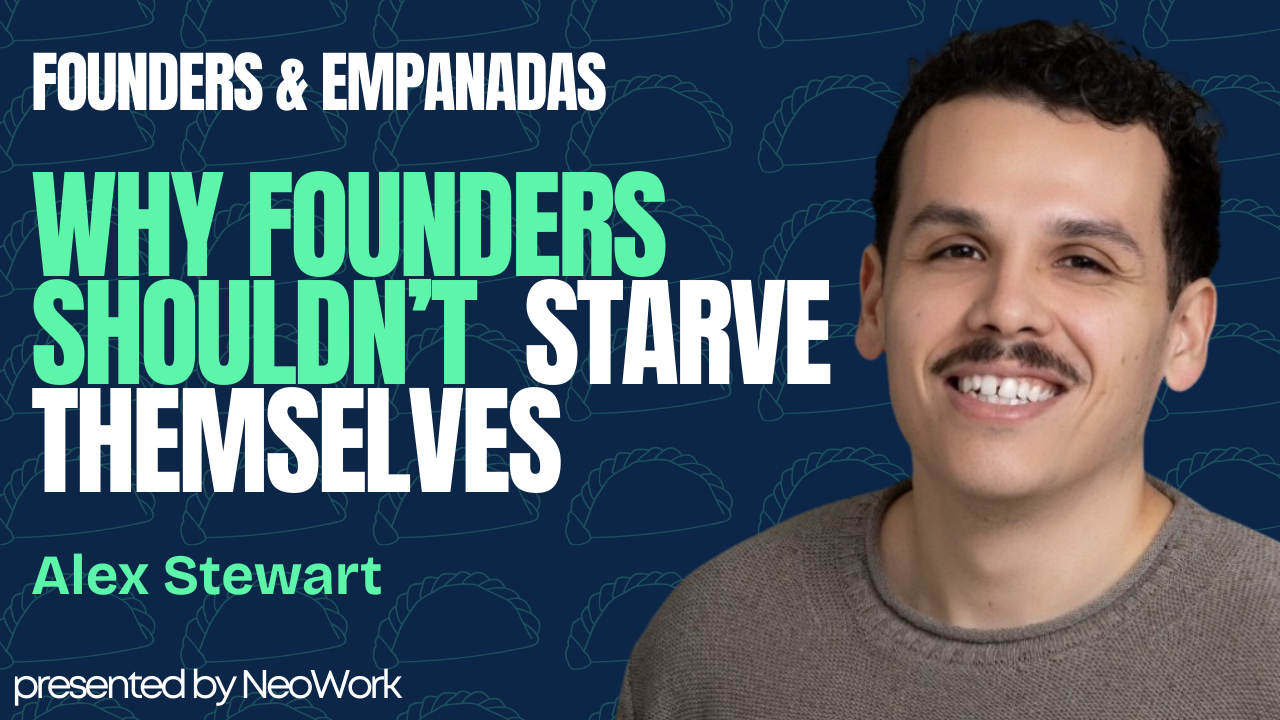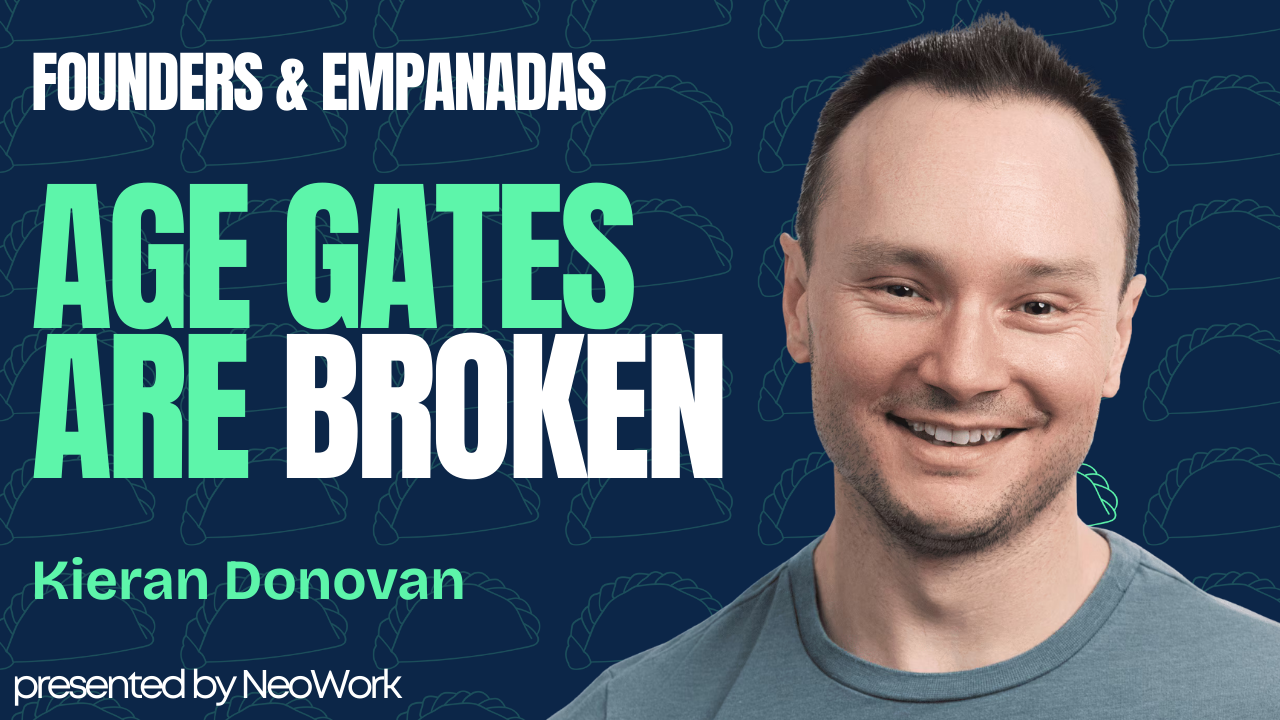.avif)
.png)
Dante DiCicco’s family has been running Italian spots in Central California since 1956. So when he saw how outdated processes were making life harder for small restaurant owners like his family, he knew there had to be a better way.
Enter Zitti: a platform leveling the playing field for smaller restaurants, enabling them to operate with big-chain efficiency.
In this Founders & Empanadas episode, Dante explores how his understanding of a market through first-hand experience helped him build a product that actually relieved the pain points of its users.
This episode is perfect for non-technical founders looking to build around what they know best and anyone looking to build a useful product around a niche market.
Below is a peak into our conversation and Dante’s journey of finding that founder-problem fit. For all the ins and outs, you’ll have to catch the full episode here:
Q: Talk to us a little bit more about your family's background and how you landed on building software for restaurant owners.
Dante: My family owned and operated Italian restaurants in central California since 1956, so, a long time. My family are Italian immigrants. My grandfather and his brothers originally started it—it’s called DiCicco's Italian Restaurant. Hence my hoodie. I’m the unofficial chief marketing officer of DiCicco’s. It started out as a family business, and it still very much is. One location back then, and now there’s over ten throughout central California. My father, his brother, and their first cousins all run them today.
Career-wise, I was at Snapchat for about seven years. But during my later years at Snapchat, I decided to finance the newest DiCicco's location—same food, but with a more modern concept. Throughout that process, I saw all the legacy processes, inefficiencies, and things that I felt strongly could be fixed and corrected. That’s what really inspired me to start Zitti.
Q: Let’s talk about the pivot you made in the early days from going broad across all small businesses to going more narrow and deep on restaurants.
Dante: Yeah, so we did originally go after all small businesses, which was a big mistake because it’s just too broad. We tried going after landscapers, plumbers, etc. But the learning was that restaurants have the most clear, concrete pain points that we could solve. Their food costs and profit margins are very easy to track and optimize compared to other types of small businesses. So after that realization, we narrowed our focus entirely to restaurants, and that’s when things started to click.
Q: With you being so close to the problem as a founder, were there any blind spots that you had where some strong convictions didn’t resonate with your users?
Dante: I think the deeper we went into it... I started by profiling restaurants by type. Like any founder in a vertical tech space would do, you’re looking at, 'Do I have single-unit mom-and-pops? Do I have small multi-unit restaurants, like 2 to 5 locations? Medium-sized multi-units, like 5 to 20 locations? And then, emerging chains or larger chains, like 50 to 100 plus locations?' That’s how I started profiling it.
But then, myself and the great Zitti team we built started to complement that by profiling owner types as well. You could have a small multi-unit run by someone who’s very old school and adverse to new technologies, or maybe someone younger who’s more open to new tech. We kind of started profiling both restaurant type and owner type, making a matrix out of that, and then tailoring our offering.
So, there were times when my personal experience didn’t align with a certain restaurant or owner type, but that process helped us refine our approach.
Q: Can you share maybe one of your favorite features of Zitti that came directly from an in-person conversation with a restaurateur?
Dante: Chat Z is Zitti’s AI assistant, which is essentially a restaurant’s digital procurement assistant. So real-world example: restaurant owners are very busy, right? They’re always on their feet. They’re managing the front of the house. They’re talking to customers. They’re trying to play air traffic control with all the servers and the hosts and the bussers, but they’re also trying to manage the chefs in the back.
Well, Zitti is really helping restaurants save money on their food costs and save time. So what Chat Z does is, it allows you to, through text—almost like a ChatGPT-like model—you’re texting Z about which vendors you work with have the best prices on your cheese products, for example, or your produce products.
Q: How did you balance staying close to the customer's problem while managing larger teams as your role and scope increased?
Dante: My Snapchat experience came in handy a lot because, when I was at Snap, I managed larger teams for several years. When Zitti started to grow, it was almost like when Zitti was just me and my co-founder, Eric, that was all new to me. But once we had a team, reporting lines, and everyone working together, managing ten people felt more like my comfort zone from my Snap days.
Even as we grew, I was always happy to dive in, do any sales call, talk to any customer, or attend trade shows. I love interacting with restaurants in person, and I think it’s key in hospitality. Those conversations help you keep the business aligned with customer needs.
Q: How did your experience at Snapchat, particularly with partnerships, help in building the product at Zitti?
Dante: I worked on new revenue streams and was really focused on launching business development partnerships with companies like Viacom, NBC, and Disney. And I was just getting a deep dive into how complex those media companies really are. That helped me think strategically about partnerships, not just vendors but partners in the traditional sense. That influenced a lot of how I approached building Ziti.
Q: Thinking through your journey with Zitti, what were some items in the budget you would have done differently or not spent on, looking back retroactively?
Dante: On the sales and marketing side, I think there’s a temptation as a founder to want to get ahead of the sales cycle. You’re excited to get your product out there, but I would have probably invested more time in that pre-product-market-fit phase, making sure everything was aligned with customer needs before pouring money into sales. For instance, we started pouring gas on sales once we felt we were meeting all of DiCicco’s needs, but in hindsight, I probably would have waited a bit longer before going after other restaurants.
Q: At what point, for our first-time founder listeners, is it appropriate to make the shift from focusing on product-market fit to investing in marketing and sales?
Dante: There’s no clear-cut answer, but once you have customers proactively telling you how good your product is—especially founders or customers outside your network—it’s a good sign. We saw this when one of our customers started using Zitti in one of their six locations, and their P&L was much better than the others. That made the other general managers say, 'We need to adopt this across all locations.' When you start seeing those kinds of anecdotes from customers and tangible results, it’s a good time to invest in scaling sales and marketing.
Topics
Dante DiCicco’s Recipe for Founder-Market Fit
Dante DiCicco’s family has been running Italian spots in Central California since 1956. So when he saw how outdated processes were making life harder for small restaurant owners like his family, he knew there had to be a better way.
Enter Zitti: a platform leveling the playing field for smaller restaurants, enabling them to operate with big-chain efficiency.
In this Founders & Empanadas episode, Dante explores how his understanding of a market through first-hand experience helped him build a product that actually relieved the pain points of its users.
This episode is perfect for non-technical founders looking to build around what they know best and anyone looking to build a useful product around a niche market.
Below is a peak into our conversation and Dante’s journey of finding that founder-problem fit. For all the ins and outs, you’ll have to catch the full episode here:
Q: Talk to us a little bit more about your family's background and how you landed on building software for restaurant owners.
Dante: My family owned and operated Italian restaurants in central California since 1956, so, a long time. My family are Italian immigrants. My grandfather and his brothers originally started it—it’s called DiCicco's Italian Restaurant. Hence my hoodie. I’m the unofficial chief marketing officer of DiCicco’s. It started out as a family business, and it still very much is. One location back then, and now there’s over ten throughout central California. My father, his brother, and their first cousins all run them today.
Career-wise, I was at Snapchat for about seven years. But during my later years at Snapchat, I decided to finance the newest DiCicco's location—same food, but with a more modern concept. Throughout that process, I saw all the legacy processes, inefficiencies, and things that I felt strongly could be fixed and corrected. That’s what really inspired me to start Zitti.
Q: Let’s talk about the pivot you made in the early days from going broad across all small businesses to going more narrow and deep on restaurants.
Dante: Yeah, so we did originally go after all small businesses, which was a big mistake because it’s just too broad. We tried going after landscapers, plumbers, etc. But the learning was that restaurants have the most clear, concrete pain points that we could solve. Their food costs and profit margins are very easy to track and optimize compared to other types of small businesses. So after that realization, we narrowed our focus entirely to restaurants, and that’s when things started to click.
Q: With you being so close to the problem as a founder, were there any blind spots that you had where some strong convictions didn’t resonate with your users?
Dante: I think the deeper we went into it... I started by profiling restaurants by type. Like any founder in a vertical tech space would do, you’re looking at, 'Do I have single-unit mom-and-pops? Do I have small multi-unit restaurants, like 2 to 5 locations? Medium-sized multi-units, like 5 to 20 locations? And then, emerging chains or larger chains, like 50 to 100 plus locations?' That’s how I started profiling it.
But then, myself and the great Zitti team we built started to complement that by profiling owner types as well. You could have a small multi-unit run by someone who’s very old school and adverse to new technologies, or maybe someone younger who’s more open to new tech. We kind of started profiling both restaurant type and owner type, making a matrix out of that, and then tailoring our offering.
So, there were times when my personal experience didn’t align with a certain restaurant or owner type, but that process helped us refine our approach.
Q: Can you share maybe one of your favorite features of Zitti that came directly from an in-person conversation with a restaurateur?
Dante: Chat Z is Zitti’s AI assistant, which is essentially a restaurant’s digital procurement assistant. So real-world example: restaurant owners are very busy, right? They’re always on their feet. They’re managing the front of the house. They’re talking to customers. They’re trying to play air traffic control with all the servers and the hosts and the bussers, but they’re also trying to manage the chefs in the back.
Well, Zitti is really helping restaurants save money on their food costs and save time. So what Chat Z does is, it allows you to, through text—almost like a ChatGPT-like model—you’re texting Z about which vendors you work with have the best prices on your cheese products, for example, or your produce products.
Q: How did you balance staying close to the customer's problem while managing larger teams as your role and scope increased?
Dante: My Snapchat experience came in handy a lot because, when I was at Snap, I managed larger teams for several years. When Zitti started to grow, it was almost like when Zitti was just me and my co-founder, Eric, that was all new to me. But once we had a team, reporting lines, and everyone working together, managing ten people felt more like my comfort zone from my Snap days.
Even as we grew, I was always happy to dive in, do any sales call, talk to any customer, or attend trade shows. I love interacting with restaurants in person, and I think it’s key in hospitality. Those conversations help you keep the business aligned with customer needs.
Q: How did your experience at Snapchat, particularly with partnerships, help in building the product at Zitti?
Dante: I worked on new revenue streams and was really focused on launching business development partnerships with companies like Viacom, NBC, and Disney. And I was just getting a deep dive into how complex those media companies really are. That helped me think strategically about partnerships, not just vendors but partners in the traditional sense. That influenced a lot of how I approached building Ziti.
Q: Thinking through your journey with Zitti, what were some items in the budget you would have done differently or not spent on, looking back retroactively?
Dante: On the sales and marketing side, I think there’s a temptation as a founder to want to get ahead of the sales cycle. You’re excited to get your product out there, but I would have probably invested more time in that pre-product-market-fit phase, making sure everything was aligned with customer needs before pouring money into sales. For instance, we started pouring gas on sales once we felt we were meeting all of DiCicco’s needs, but in hindsight, I probably would have waited a bit longer before going after other restaurants.
Q: At what point, for our first-time founder listeners, is it appropriate to make the shift from focusing on product-market fit to investing in marketing and sales?
Dante: There’s no clear-cut answer, but once you have customers proactively telling you how good your product is—especially founders or customers outside your network—it’s a good sign. We saw this when one of our customers started using Zitti in one of their six locations, and their P&L was much better than the others. That made the other general managers say, 'We need to adopt this across all locations.' When you start seeing those kinds of anecdotes from customers and tangible results, it’s a good time to invest in scaling sales and marketing.
Topics
Related Blogs
Related Podcasts














